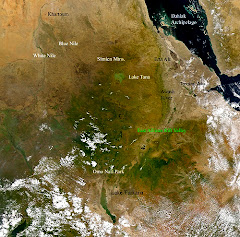I found this on a UNICEF site. This will help describe the situation in Ethiopia.
Ethiopia: Steady increase in street children orphaned by AIDS
14-year-old Mandefro Kassa lives on the streets of Bahr Dar, Ethiopia. The country counts one of the largest populations of orphans in the world: 13 per cent of children are missing one or both parents.
By Indrias Getachew
BAHR DAR, Amhara Region, Ethiopia, 20 January 2006 – “The street has been my home since I can remember. It’s been more than one year since I moved here (Bahr Dar) and all this time, I have not seen one good thing about living on the street. Everything is horrible,” says 14-year-old Mandefro Kassa, who grew up as an orphan on the streets of Woreta, a provincial town in Ethiopia. Ethiopia counts one of the largest populations of orphans in the world: 13 per cent of children throughout the country are missing one or both parents. This represents an estimated 4.6 million children – 800,000 of whom were orphaned by HIV/AIDS. The country has seen a steady increase in the number of children becoming orphaned because of AIDS. In the past, famine, conflict and other diseases were the main factors that claimed the lives of parents.
Street children are continuously exposed to various forms of exploitation, including sexual exploitation. They do not have access to basic rights such as access to proper care, education, psychological support and supervision.
Grim statistics
Many street children like Mandefro don’t have access to basic rights such as proper care, education, psychological support and supervision. Often, orphans and other vulnerable children are forced to work to earn an income. They are exposed to various forms of exploitation, including sexual exploitation. In Addis Ababa more than 30 per cent of girls aged 10-14 are not living with their parents. Twenty per cent of these 30 per cent have run away from child marriages. Twelve per cent of adolescents aged 10-14 – of the 30 per cent not living with their parents – surveyed in two areas of Addis Ababa were domestic workers. They are very young, very vulnerable to exploitation and abuse, and typically have no legal or social support. In the Amhara region, the average age of marriage for girls is 14, while at the national level the mean age for marriage is 17. There are about 2.5 million children with disabilities.
No social net for vulnerable children. Very few government services help orphans. The primary coping strategy for communities has therefore been the extended family. Increasingly, however, the capacity of the extended family to support the growing numbers of orphans is declining.
“As more and more parents die, the capacity of the extended family to take care of orphans becomes smaller and smaller,” says Björn Ljungqvist, UNICEF Representative in Ethiopia. “In all countries where you have a big HIV/AIDS epidemic, at first you don’t see any orphans at all, as they are absorbed by the traditional systems. And then all of a sudden you seem to reach some type of breaking point and you start finding these children in the streets, you start finding them working in difficult conditions, you start finding even child-headed households.”
UNICEF, in partnership with local HIV/AIDS Prevention and Control Offices as well as government ministries, is responding to the needs of orphans and vulnerable children in Ethiopia through collaboration with NGOs, youth and community-based organizations.
UNICEF engaged in helping children affected by HIV/AIDS
UNICEF is supporting the rights of children affected by HIV. This includes efforts to alleviate the personal and social impact of the pandemic by ensuring comprehensive care and support to children and families affected by HIV and AIDS.
Strategies include:
strengthening the capacity of extended families,
mobilizing and strengthening community and home-based responses,
strengthening the capacity of children and young people to meet their own needs,
ensuring the government protects the most vulnerable children and provides essential policies and services,
creating an enabling environment for HIV and AIDS-affected children and their families.
UNICEF is also trying to reduce children’s vulnerability to HIV by ensuring that they have access to their right to health, education, equality and protection. Children have become the most vulnerable and most prone group to be infected with HIV. This is particularly true of adolescent girls and young women – those aged 15-24 – who constitute between 40 and 50 per cent of all new infections.
Key partnerships
UNICEF, in partnership with federal and regional HIV/AIDS Prevention and Control Offices, as well as government ministries, is responding to the needs of orphans and vulnerable children in Ethiopia through collaborations with non-governmental organizations, and youth and community-based organizations.
There are around 10,000 Anti-AIDS Clubs in the country, and UNICEF Ethiopia sees these partnerships as the most efficient way to reach children who are infected or affected by HIV/AIDS.
Sabine Dolan contributed to this report from New York.
(here is the link to this story- http://www.unicef.org/infobycountry/ethiopia_30783.html)
I once remember thinking in my own mind when it would consider the plight of the poor in other countries that it was too far away for me to do anything about. That there was enough problems here in our own country. I was like the treasure seeker in the Titanic movie, after hearing the story of the lady and all she had went through, afterwords when he was talking to her granddaughter, he told her that all the time he spent looking for the necklace from the movie, that he never "let it in". That is the story, the suffering, the loss of life involved when the titanic went down. Thats how I was with stories of some far away place like Ethiopia. It was easier for me to keep my focus on my middle class pursuit of happiness than to "let it in".
Then God showed up. Want to know how you can tell if God shows up. Things start changing. Like today. I went on a hike with my friend John and his cousin Chris to Virginia Kendall, both of them are backpackers. John turned me onto it last year. He took me on my first trip in Oct and I was immediately hooked. I cant wait to go again. In fact I have seen stories of adoptive families hiking in Ethiopia when they travel to get their child. Hey we could save some money right- haha. After the hike we went up to Appalachian Outfitters which is right up the road from where we hiked. As I walked around and saw so many things I could use for hiking / backpacking all I could think of was the adoption. I could not find a place to run to in my mind where I escaped the thought of the adoption. I soon stepped outside and just waited for the other guys to come out. I still have a passion to go backpacking and I will be able to go on a few weekend trips I am sure, its just that God has changed the priority of my heart. You see, I was finished with having children. As you know we have four kids. As we have 2 girls and 2 boys, everyone has a brother and everyone has a sister so there should be no complaints right. I was done. Like I said though, when God shows up things change.
Our pastor started a series last week he titled " I-change". It is a spoof on IPODs. Its all about how we need to change. You know while that can be challenging to us, isnt it also hopeful. Dont we all deep down really want to make changes. Dont most of us know, if we are really honest with ourselves, that we have holes in our life. Our pastor gave us a devotional he developed and we were to begin going through it this week. On page 4 he offers a series of 20 possible issues we may struggle with in our lives. We were to inventory our lives against this list. I checked off 8 of them as areas I need to work on. The one God is really impressing on me right now is overeating. I have been burdened by this sin in my life for some time. I have been trying to work on it for quite some time. This past week I have a renewed sense of comittment to it again. I have gone on a hike every day now for 8 days. You see we all struggle with something. You might be wondering why I would share something like this on the blog about adoption. I just want you all to know that we are like everyone else. God is not finished with us yet. He is still pruning us sometimes on a daily basis. I for one am glad. It gives me hope to know that God loves me and is working on me. Many people have an image of God of a school teacher with a ruler cracking our knuckles. Sort of a cosmic killjoy if you will. God is not like that. Everything he does he does for our benefit. Its up to us to react properly.
Well I think I have rambled enough for tonight. Until next time, goodnight.
Saturday, April 5, 2008
Subscribe to:
Post Comments (Atom)
























No comments:
Post a Comment